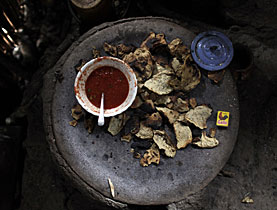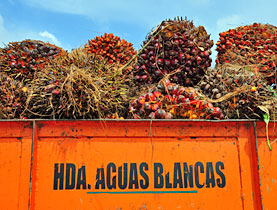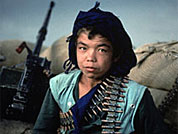Leaders pledge to end “silent hunger crisis”

As the World Food Summit draws to a close, the Swiss have welcomed moves to increase agricultural aid and renew commitments to stopping hunger.
The meeting, held in Rome by the United Nations Food and Agriculture Organization (FAO), has been addressing the growing global hunger crisis. But critics say the outcome is not concrete enough.
The FAO says the number of people going hungry has breached the one billion mark this year for the first time. The situation has been called a “silent hunger crisis” by FAO Director-General Jacques Diouf.
The economic downturn is one reason why global food security – access to guaranteed and safe food – has worsened, says the body.
The three-day summit, which was attended by around 60 heads of states and dozens of ministers, approved its final declaration just hours after it started on Monday, in a show of broad consensus.
Contained in it were agreements to increase agricultural aid to and investment in developing nations to boost self sufficiency. There were also pledges to improve governance of global food issues and to consider climate change.
Those attending reaffirmed their commitment to the UN Millennium Goal of halving the number of hungry people by 2015.
“The Swiss delegation is pretty pleased with the contents of the declaration since our main issues are fully reflected, especially in the area of governance and international collaboration,” Swiss delegation member François Pythoud told swissinfo.ch.
Particularly pleasing, said Pythoud, was the recognition of the establishment of the global partnership for agriculture, food security and nutrition, which includes the main actors involved in fighting hunger: governments, civil society, research and the private sector.
Critical voices
However, delegates did not commit to any sums, in particular the $44 billion (SFr45 billion) a year in agricultural aid – or 17 per cent of overall foreign aid – that the FAO says is necessary in the coming decades.
While content with the general policy shift, Diouf has voiced frustration that the declaration was not more specific. He also wanted agreement to see hunger stopped by 2025.
“I am not satisfied that some of the concrete proposals I made were not accepted,” he told a news conference on Monday evening. “There was no consensus on this and I regret it.”
Non-governmental organisation Oxfam called the text a “massive wasted opportunity”, while Greenpeace decried the declaration as “empty rhetoric”.
Pythoud said that the summit had not been intended as a pledging exercise. This had taken place in L’Aquila earlier this year when the G8 group of industrialised nations decided to give $20 million in farm aid to developing countries
“The Rome Declaration gives some clear indication of how to implement some of the pledges taken at the L’Aquila summit,” said Pythoud.
Swiss aims
Switzerland came to the meeting supporting more investment in agriculture, as well as the improvement of coordination among those fighting hunger, particularly through a revitalised and reformed FAO.
The Swiss delegation, which was led by Federal Agriculture Office head Manfred Bötsch, has also been underlining the need to increase agricultural productivity and the role of agriculture in the global climate change negotiations, particularly in the light of the key Copenhagen conference next month.
But the Swiss still want new and innovative ways of funding to be explored, such as through public-private partnerships.
Switzerland is already facilitating initiatives involving the FAO and the private dairy sector to boost the livelihoods of small-scale dairy farmers in developing countries.
Pythoud said the next step was to put the L’Aquila summit pledges and the Rome Declaration measures together “so that it will really have an impact on the people suffering from hunger”.
“It’s like the president of Mali said, we come to this summit and at the end we have a stomach full of commitments but one year later nothing has happened,” said Pythoud, who is the head of the international sustainable agriculture unit at the Agriculture Office.
“We hope that this time we will really see in practice the concrete outcome of this declaration.”
Isobel Leybold-Johnson, swissinfo.ch
The World Food Summit on Food Security took place in Rome from November 16-18.
It was the third time that a summit of this kind was held. The first was in 1996 and the second in 2002.
In 2008, a High-Level Conference on food security was held in Rome, which Switzerland also attended. The aim was to address the issues of bioenergy/fuels and food security. As food prices had risen considerably at the beginning of 2008, it was decided to address this as well in the final resolution of the conference.
Food security exists when all people, at all times, have access to sufficient, safe and nutritious food to meet their dietary needs and food preferences for an active and healthy life.
This involves 4 conditions:
– adequacy of food supply or availability;
– stability of supply, without fluctuations or shortages from season to season or from year to year;
– accessibility to food or affordability; and
– quality and safety of food.
(source: FAO)
The situation is not all gloomy. In its Pathways to Success report, released on November 11, the FAO said that rising global hunger figures had masked the fact that 31 out of 79 countries had registered a significant decline in the number of undernourished people since the early 1990s.
16 of these countries had already achieved or were on track to achieving the Millennium Development Goal of halving the number of the hungry by 2015.
There are four common denominators for success: promotion of economic growth and personal wellbeing; outreach to the vulnerable and investment in rural poor; ensuring achievements are maintained; planning for a sustainable future.
The FAO has also launched an online anti-hunger campaign, with a petition for the public (see links).
(source: FAO)

In compliance with the JTI standards
More: SWI swissinfo.ch certified by the Journalism Trust Initiative





You can find an overview of ongoing debates with our journalists here. Please join us!
If you want to start a conversation about a topic raised in this article or want to report factual errors, email us at english@swissinfo.ch.